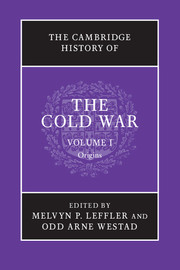Book contents
- Frontmatter
- 1 The Cold War and the international history of the twentieth century
- 2 Ideology and the origins of the Cold War, 1917–1962
- 3 The world economy and the Cold War in the middle of the twentieth century
- 4 The emergence of an American grand strategy, 1945–1952
- 5 The Soviet Union and the world, 1944–1953
- 6 Britain and the Cold War, 1945–1955
- 7 The division of Germany, 1945–1949
- 8 The Marshall Plan and the creation of the West
- 9 The Sovietization of Eastern Europe, 1944–1953
- 10 The Cold War in the Balkans, 1945–1956
- 11 The birth of the People’s Republic of China and the road to the Korean War
- 12 Japan, the United States, and the Cold War, 1945–1960
- 13 The Korean War
- 14 US national security policy from Eisenhower to Kennedy
- 15 Soviet foreign policy, 1953–1962
- 16 East Central Europe, 1953–1956
- 17 The Sino-Soviet alliance and the Cold War in Asia, 1954–1962
- 18 Nuclear weapons and the escalation of the Cold War, 1945–1962
- 19 Culture and the Cold War in Europe
- 20 Cold War mobilization and domestic politics: the United States
- 21 Cold War mobilisation and domestic politics: the Soviet Union
- 22 Decolonization, the global South, and the Cold War, 1919–1962
- 23 Oil, resources, and the Cold War, 1945–1962
- Bibliographical essay
- Index
- References
2 - Ideology and the origins of the Cold War, 1917–1962
Published online by Cambridge University Press: 28 September 2010
- Frontmatter
- 1 The Cold War and the international history of the twentieth century
- 2 Ideology and the origins of the Cold War, 1917–1962
- 3 The world economy and the Cold War in the middle of the twentieth century
- 4 The emergence of an American grand strategy, 1945–1952
- 5 The Soviet Union and the world, 1944–1953
- 6 Britain and the Cold War, 1945–1955
- 7 The division of Germany, 1945–1949
- 8 The Marshall Plan and the creation of the West
- 9 The Sovietization of Eastern Europe, 1944–1953
- 10 The Cold War in the Balkans, 1945–1956
- 11 The birth of the People’s Republic of China and the road to the Korean War
- 12 Japan, the United States, and the Cold War, 1945–1960
- 13 The Korean War
- 14 US national security policy from Eisenhower to Kennedy
- 15 Soviet foreign policy, 1953–1962
- 16 East Central Europe, 1953–1956
- 17 The Sino-Soviet alliance and the Cold War in Asia, 1954–1962
- 18 Nuclear weapons and the escalation of the Cold War, 1945–1962
- 19 Culture and the Cold War in Europe
- 20 Cold War mobilization and domestic politics: the United States
- 21 Cold War mobilisation and domestic politics: the Soviet Union
- 22 Decolonization, the global South, and the Cold War, 1919–1962
- 23 Oil, resources, and the Cold War, 1945–1962
- Bibliographical essay
- Index
- References
Summary
Russia’s Great October Socialist Revolution of 1917 triggered a confrontation between the Soviet Union and the United States that would last much of the twentieth century. In its early years, each side aimed to transform the other. American–Soviet conflict became global only in the 1940s, at which point it shaped the international system and every nation in it. In addition to competition over markets or territories, this new form of struggle – the Cold War – was at its root a battle of ideas: American liberalism vs. Soviet Communism.
The ideologies animating the Cold War had centuries-long pedigrees, emerging by the early twentieth century as powerful and compelling visions for social change. These ideologies – explicit ideas and implicit assumptions that provided frameworks for understanding the world and defining action in it – were not antithetical to material interests, but often shaped the way foreign-policy officials understood such interests. Ideologies were lenses that focused, and just as often distorted, understandings of external events and thus the actions taken in response.
Ideologies in conflict and in common
Though American leaders typically proclaimed their immunity from ideological temptations, this self-perception ignored a rich tradition of American thought and policy that developed, defined, and acted upon a clear set of ideological premises. The foreign policy of the United States, like so much else in that country, drew on a long tradition of liberalism originating in the ideas of John Locke. As the etymology suggests, Lockean liberalism was, its core, a theory of liberty, one that viewed liberty as defined for the individual, based in law, and rooted in property. The Declaration Independence paraphrased Locke in proclaiming human beings “endowed by their Creator” with rights to “life, liberty and [where Locke had emphasized property] the pursuit of happiness.” Liberty could be protected only by a system of laws in a polity guaranteeing popular sovereignty. A government, furthermore, should provide only formal freedoms (protecting the rights of property and participation), not substantive ones (equality of condition).
- Type
- Chapter
- Information
- The Cambridge History of the Cold War , pp. 20 - 43Publisher: Cambridge University PressPrint publication year: 2010
References
- 28
- Cited by

